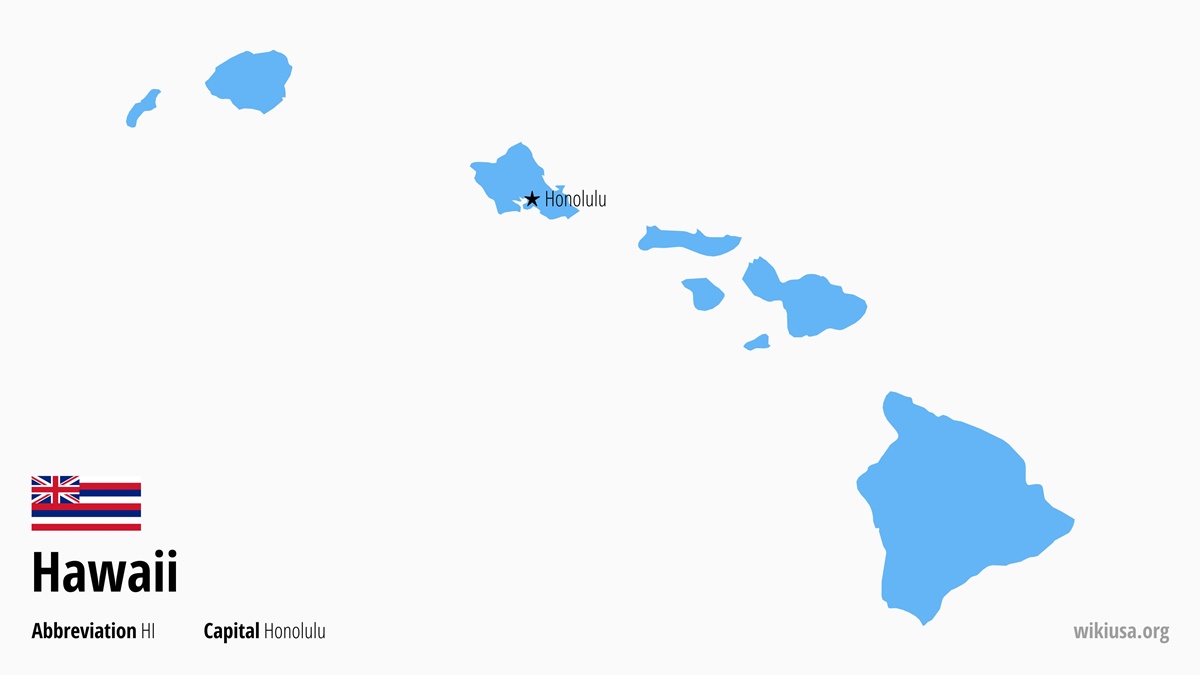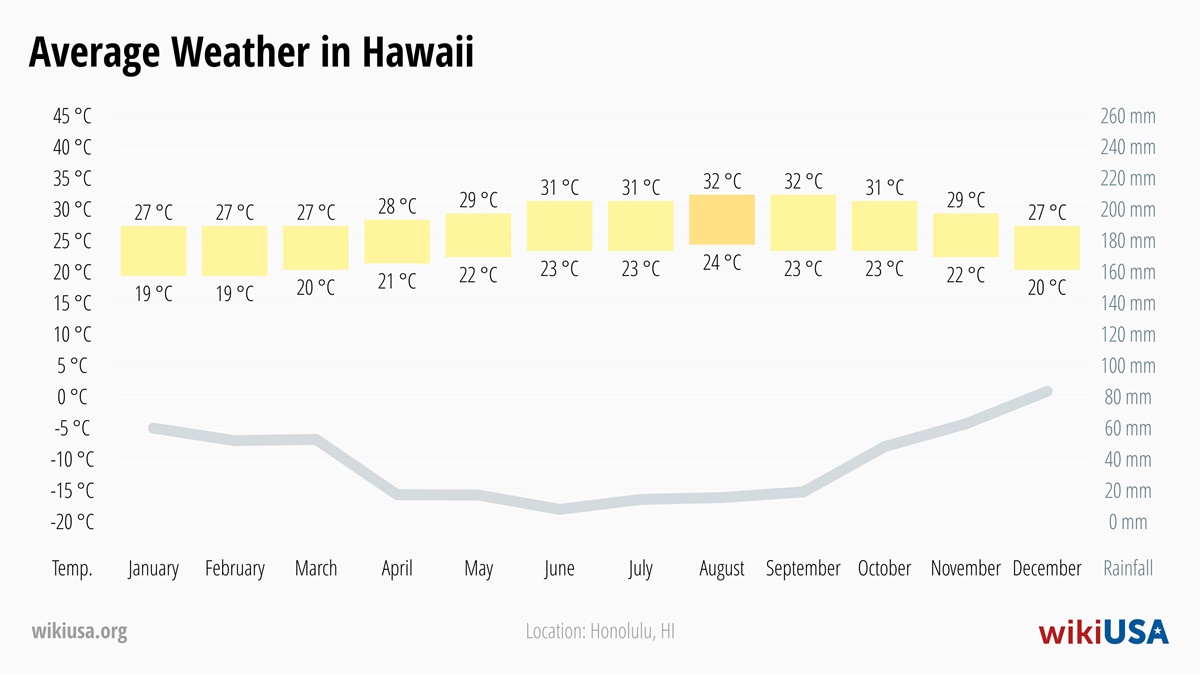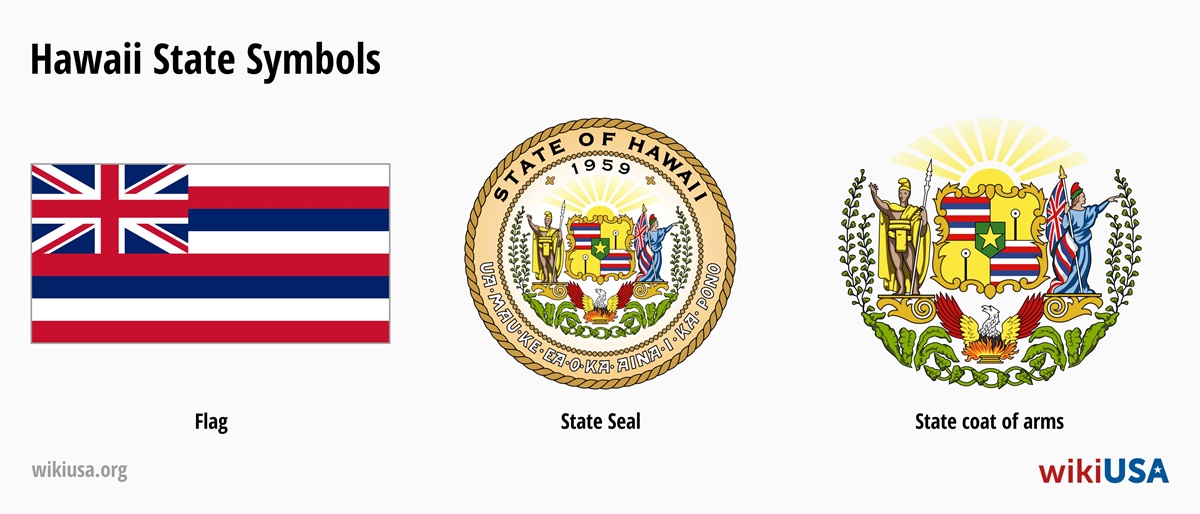Hawaii (HI) is the only fully island-based U.S. state, known for Waikiki Beach, tropical nature, and several volcanoes. A dark day in the islands’ history was Sunday, December 7, 1941, when Japan launched a surprise attack with approximately 353 aircraft. Top attractions in Hawaii include Pearl Harbor, the Mauna Kea volcano, and the Hawaiʻi Volcanoes National Park. The capital and largest city of Hawaii is Honolulu.
-
Table of Contents
Basic Information
Name Hawaii Abbreviation HI Capital Honolulu Largest city Honolulu (Population: 350 964) Current time 6:48 Time zone HAST (UTC-10), the state does not observe daylight saving time Population 1,455,274 (#40 most populous US state) Area 10,931 sqmi (#43 largest US state) Admitted to the Union August 21, 1959 (#50 state to join) ⭐ Capital of Hawaii
The capital of the state of Hawaii is Honolulu, which officially gained city status on April 30, 1907. The name Honolulu comes from the Hawaiian language and translates as “sheltered harbor” or “protected bay”. It became the state capital on August 21, 1959, when Hawaii joined the Union. Prior to that, however, Honolulu had already served as the capital of the Hawaiian Kingdom, the Republic of Hawaii, and the Territory of Hawaii.
🏙️ Largest City in Hawaii
The largest city in Hawaii is Honolulu, with a population of 350,964. In second place is East Honolulu with 50,922 residents, followed by Pearl City, the third-largest city in the state, with a population of 45,295.
🕒 Time in Hawaii
The current time in Honolulu, Hawaii, is 6:48. All islands observe Hawaii–Aleutian Standard Time (HAST, UTC-10), and unlike most U.S. states, Hawaii does not observe daylight saving time.
🧑🤝🧑 Population of Hawaii
According to 2023 data, Hawaii had a population of 1,455,274, making the archipelago the 40th most populous U.S. state.
📍 Area of Hawaii
The total area of the state of Hawaii is 10,931 sqmi, with 6,424 sqmi being land and 4,507 sqmi covered by water. Hawaii ranks as the 43rd largest U.S. state by area.
-
Fun Facts About the State of Hawaii
🧩 Which States Border Hawaii
Hawaii is the only U.S. state that does not border any other state. The state recognizes 137 volcanic islands and uninhabitable reefs, all completely surrounded by the Pacific Ocean.
📅 Hawaii’s Admission to the Union
Hawaii joined the Union on August 21, 1959, becoming the 50th and final state to emerge from the former Territory of Hawaii.
📛 Hawaii’s State Nickname
Hawaii’s official nickname is “The Aloha State”. The nickname is derived from the Hawaiian word “Aloha”, which is used as a greeting, but its meaning is much deeper. In Hawaiian, Aloha expresses love, affection, peace, mercy, or compassion.
⛰️ Highest Mountain in Hawaii
The highest mountain in Hawaii is Mauna Kea, with a peak elevation of 13,803 ft. It is located on the island of Hawaiʻi.
🏞️ Rivers in Hawaii
The longest river in Hawaii is the Wailuku River, with a total length of 28 mi. It is followed by the South Fork Kaukonahua Stream (18 mi), the North Fork Kaukonahua Stream (16 mi), the Hanalei River (16 mi), and the Kolekole Stream (12 mi).
🎓 Universities in Hawaii
The largest university in Hawaii is the University of Hawaiʻi at Mānoa, which was established in 1907 in the capital city of Honolulu. It enrolls approximately 18,000 students.
✉️ ZIP Codes in Hawaii
Hawaii is assigned the 967xx and 968xx ZIP code ranges. A map of these areas can be found in the article ZIP Codes in the USA. To look up a ZIP code for a specific address, visit the USPS website.
-
Weather in Hawaii
The best time to visit Hawaii is late spring and early fall, when there is less rainfall and temperatures remain pleasantly mild. Unlike the peak season during the winter months, tourist attractions and beaches are less crowded, and accommodation prices tend to be lower.
The rainy season in Hawaii lasts from March to May, with temperatures in Honolulu typically ranging from 75 °F to 82 °F. Rain showers are very common, especially on the windward sides of the islands. Spring is an ideal time to enjoy the beaches and blooming nature.
Summer in Hawaii brings higher humidity and temperatures ranging between 73 °F and 90 °F. From June through early September, there is less rainfall than in spring, and the ocean is warm—perfect for swimming. Thunderstorms and hurricanes are rare.
Fall in Hawaii means a slight cooling, with temperatures dropping to around 73 °F to 84 °F, but starting in October, the number of rainy days increases. November is the wettest fall month.
Winter in Hawaii is very warm, with temperatures in Honolulu typically ranging from 66 °F to 81 °F. The total rainfall is highest during this season, with the most rain falling on the northern and eastern sides of the islands. From December to March, the northern coast of Hawaii experiences the biggest waves, creating ideal conditions for surfing.
🌡️ Average Temperatures and Rainfall in Hawaii
-
What to See in Hawaii
1️⃣ USS Arizona Memorial at Pearl Harbor
USS Arizona Memorial commemorates the attack on Pearl Harbor on December 7, 1941, which led the United States into World War II. It is located on the island of Oahu, near the capital city of Honolulu. The memorial is one of the top attractions in all of Hawaii, positioned above the sunken USS Arizona battleship.
You can also visit the museum and the visitor center, where you’ll learn detailed information about one of the darkest days in American history.
2️⃣ Haleakalā National Park
Haleakalā National Park is located on the island of Maui. Its main attraction is Haleakalā volcano, whose summit reaches an elevation of 10,023 ft. One of the most memorable experiences in the park is watching the sunrise from the volcano’s summit. There are several hiking trails through the park, offering views of volcanic craters and panoramic landscapes.
🗺️ Maui, Hawaii
3️⃣ Waikiki Beach
Waikiki Beach in Honolulu on the island of Oahu is one of the most famous beaches in the world. Surfing is the most popular water sport here, with great conditions even for beginners. The beach with its white sand is surrounded by luxury hotels and restaurants, and the iconic view of the dormant volcano Diamond Head completes the scenery.
4️⃣ Mauna Kea
With its summit at an elevation of 13,803 ft, Mauna Kea is the highest mountain in Hawaii. At its peak lies the renowned Mauna Kea Observatories, where stars can be observed through professional telescopes. The conditions for stargazing at Mauna Kea are considered among the best in the world. The climb to the summit is fairly demanding, but the breathtaking views of the surrounding landscape are well worth the effort.
5️⃣ Hawaii Volcanoes National Park
Hawaii Volcanoes National Park was established in 1916 to help protect the Kilauea and Mauna Loa volcanoes, which are among the most active in the world. Visitors to the park can observe volcanic activity and lava fields. Several hiking trails of varying difficulty levels run throughout the park.
6️⃣ Scenic Hana Highway
The Hana Highway on the island of Maui is considered one of the most beautiful roads in the world and is also known as the Road to Hana. The route, which spans 64.4 mi, runs along the island’s eastern coast and offers stunning views of waterfalls, coastline, and jungle nearly the entire way. Be prepared for a challenging drive, with approximately 600 curves and 50 bridges along the route.
🗺️ Maui, Hawaii
7️⃣ Polynesian Cultural Center
The Polynesian Cultural Center on the island of Oahu offers visitors a unique opportunity to learn more about Polynesian cultures and the history not only of Hawaii, but also of Tahiti, Fiji, and New Zealand. The park features a village with demonstrations of traditional crafts and dances. You can also attend an evening performance featuring a fire show.
🗺️ Oahu, Hawaii
8️⃣ Kalalau Trail
The Kalalau Trail on the island of Kauai is one of the most famous hiking trails in Hawaii. The trail is 11.0 mi long and stretches along the coastline, offering beautiful views of cliffs, the ocean, and the rainforest. The entire route is challenging, but it is also possible to hike just a portion of the trail and still enjoy breathtaking views. You can reach the trailhead by car.
9️⃣ Iolani Palace
Iolani is the only royal palace in the United States, located in downtown Honolulu, and it vividly illustrates Hawaii’s rich history. The palace was the residence of the last reigning monarchs of the Hawaiian Kingdom, including King Kalakaua and Queen Liliʻuokalani.
Visitors can tour the palace to see the royal chambers and ornately decorated interiors firsthand, and to learn more about the fall of the monarchy. Anyone interested in Hawaii’s history should be sure to include Iolani Palace in their travel plans.
🔟 Kualoa Ranch
Kualoa Ranch is a private nature reserve on the island of Oahu, best known as a filming location for movies like Jurassic Park and Godzilla. The park offers a wide range of outdoor activities for visitors, including horseback riding, ATV tours, and an adrenaline-filled zipline. For those who prefer more relaxed activities, there are scenic views of Kaʻaʻawa Valley and the natural beauty of Hawaii to enjoy.
🗺️ Oahu, Hawaii
-
Largest Cities in Hawaii
The table below lists the ten largest cities in the state of Hawaii in 2023, based on data from the federal agency United States Census Bureau, whose primary mission is to conduct the national census.
City County Population 1 Honolulu Honolulu 350,964 Map of Honolulu 2 East Honolulu Honolulu 50,922 Map of East Honolulu 3 Pearl City Honolulu 45,295 Map of Pearl City 4 Hilo Hawaii 44,186 Map of Hilo 5 Waipahu Honolulu 43,485 Map of Waipahu 6 Kailua Honolulu 40,514 Map of Kailua 7 Kaneohe Honolulu 37,430 Map of Kaneohe 8 Kahului Maui 28,219 Map of Kahului 9 Mililani Town Honolulu 28,121 Map of Mililani Town 10 Ewa Gentry Honolulu 25,707 Map of Ewa Gentry -
Sports Teams in Hawaii
🏒 Hockey (NHL)
There is no NHL team based in Hawaii.
🏈 American Football (NFL)
Hawaii is not represented in the NFL.
🏀 Basketball (NBA)
There is no NBA basketball team in Hawaii.
⚾ Baseball (MLB)
Hawaii does not have a team playing in the MLB.
⚽ Soccer (MLS)
No team from Hawaii competes in the MLS.
-
State Symbols of Hawaii
Hawaii has adopted a variety of state symbols; this article highlights just a few of them.
Flag of the State of Hawaii
The flag was first adopted by the Kingdom of Hawaii in the early 19th century and continued to be used even after the kingdom’s dissolution in 1893. Hawaii is the only U.S. state whose flag includes the symbol of another country. The Union Jack in the upper-left corner reflects Hawaii’s historic ties with Britain. The eight stripes represent Hawaii’s eight main islands, and the colors do not hold any specific symbolic meaning.
Seal of the State of Hawaii
The design of the state seal was adopted in 1959, when Hawaii became the 50th state of the United States. It is based on the original seal of the Republic of Hawaii, created by Honolulu resident Viggo Jacobsen. The design draws from the royal coat of arms of the Hawaiian Kingdom, which was used during the reign of King Kamehameha III.
State Bird
Hawaii’s official state bird is the endangered Hawaiian goose (Branta sandvicensis), locally known as the nēnē due to the sound it makes. It can be found on four of Hawaii’s islands, typically inhabiting lava plains, pastures, and shrublands.
State Fish
Hawaiian law also recognizes an official state fish—the reef triggerfish (Rhinecanthus rectangulus). Notably, the fish emits grunting sounds when stressed, likely to warn other fish of potential danger.
State Flower
Hawaii’s state flower is the yellow hibiscus (Hibiscus brackenridgei), which commonly grows on the islands of Hawaii, Molokai, Lanai, and Maui at elevations of 394 ft–2,592 ft.
State Mammal
Among the state symbols is the endangered Hawaiian monk seal (Neomonachus schauinslandi), which primarily inhabits the northwestern region of the Hawaiian Islands.
State Plant
The official state plant is taro (Colocasia esculenta), known in Hawaiian as kalo. In traditional Hawaiian cuisine, it serves a role similar to that of potatoes, and even its leaves are used in cooking.
State Tree
Hawaii’s state tree is the kukui tree (Aleurites moluccanus), which was historically used to provide light. The nuts of the tree were strung on palm fronds and burned sequentially.
State Dance
The hula is a legally recognized symbol of Hawaii. This traditional dance form tells stories and is usually accompanied by chanting or singing. Its style varies across the different islands.
State Musical Instrument
The ukulele is officially recognized by local legislation as a state symbol. This musical instrument was brought to Hawaii by Portuguese immigrants from Madeira and the Azores in the late 19th century.

 10 Best Photo Places in the USA
10 Best Photo Places in the USA







Contribute with Your Question or Personal Experience